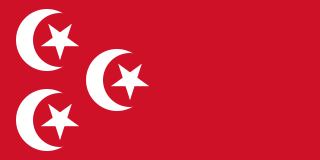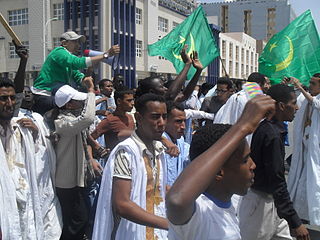Related Research Articles

A protest is a public expression of objection, disapproval, or dissent towards an idea or action, typically a political one. Protests can be thought of as acts of cooperation in which numerous people cooperate by attending, and share the potential costs and risks of doing so. Protests can take many different forms, from individual statements to mass political demonstrations. Protesters may organize a protest as a way of publicly making their opinions heard in an attempt to influence public opinion or government policy, or they may undertake direct action in an attempt to enact desired changes themselves. When protests are part of a systematic and peaceful nonviolent campaign to achieve a particular objective, and involve the use of pressure as well as persuasion, they go beyond mere protest and may be better described as civil resistance or nonviolent resistance.

Act Now to Stop War and End Racism (ANSWER), also known as International A.N.S.W.E.R. and the ANSWER Coalition, is a United States–based protest umbrella group consisting of many antiwar and civil rights organizations. Formed in the wake of the September 11th attacks, ANSWER has since helped to organize many of the largest anti-war demonstrations in the United States, including demonstrations of hundreds of thousands against the Iraq War. The group has also organized activities around a variety of other issues, ranging from the Israel/Palestine debate to immigrant rights to Social Security to the extradition of Luis Posada Carriles.

The protests of 1968 comprised a worldwide escalation of social conflicts, which were predominantly characterized by the rise of left-wing politics, anti-war sentiment, civil rights urgency, youth counterculture within the silent and baby boomer generations, and popular rebellions against state militaries and bureaucracies.

Women Strike for Peace was a women's peace activist group in the United States. In 1961, nearing the height of the Cold War, around 50,000 women marched in 60 cities around the United States to demonstrate against the testing of nuclear weapons. It was the largest national women's peace protest during the 20th century. Another group action was led by Dagmar Wilson, with about 1,500 women gathering at the foot of the Washington Monument while President John F. Kennedy watched from the White House. The protest helped "push the United States and the Soviet Union into signing a nuclear test-ban treaty two years later". Reflecting the era in which the group's leaders had been raised, between the First-wave feminism and the Second-wave feminism movements, their actions and pleas leaned towards female self-sacrifice rather than towards their own self-interests. However, they pushed the power of a concerned mother to the forefront of American politics, transforming the mother from a "passive victim of war to active fighter for peace".

The June 1976 protests were a series of protests and demonstrations in the Polish People's Republic that took place after Prime Minister Piotr Jaroszewicz revealed the plan for a sudden increase in the price of many basic commodities, particularly food. Prices in Poland were at that time fixed, and controlled by the government, which was falling into increasing debt.
Freedom of assembly in Russia is granted by Article 31 of the Constitution adopted in 1993, where it states that citizens of the Russian Federation shall have the right to gather peacefully, without weapons, and to hold meetings, rallies, demonstrations, marches and pickets. In practice, the right to freedom of assembly is restricted by Russian authorities. According to a Russian law introduced in 2014, a fine or detention of up to 15 days may be given for holding a demonstration without the permission of authorities and prison sentences of up to five years may be given for three breaches. Single-person pickets have resulted in fines and a three-year prison sentence.

Venezuelan protests for and against President Hugo Chávez's proposed 2 December constitutional referendum occurred after the National Assembly approved the referendum on 2 November 2007.

The Sultanate of Egypt was the short-lived protectorate that the United Kingdom imposed over Egypt between 1914 and 1922.
The Al-Wathbah uprising or simply Al-Wathbah, which means The Leap in Arabic, was the term that came to be used for the urban unrest in Baghdad in January 1948. The protests were sparked by the monarchy's plans to renew the 1930 Anglo-Iraqi Treaty that effectively made Iraq a British protectorate. Nuri al-Said, the Prime Minister of Iraq, was planning on renewing, albeit in a revised form, this 1930 treaty that tied Iraq to British interests, allowed for the unrestricted movement of British troops on Iraqi soil, and provided significant protection to the British-installed Iraqi monarchy.
The 1960s Berkeley protests were a series of events at the University of California, Berkeley, and Berkeley, California. Many of these protests were a small part of the larger Free Speech Movement, which had national implications and constituted the onset of the counterculture of the 1960s. These protests were headed under the informal leadership of students Mario Savio, Jack Weinberg, Brian Turner, Bettina Aptheker, Steve Weissman, Art Goldberg, Jackie Goldberg, and others.

The 1982 demonstrations in Poland refers to anti-government street demonstrations organized by underground Solidarity to commemorate the second anniversary of the Gdańsk Agreement. The bloodiest protest occurred in southwestern Poland, in the town of Lubin, on August 31, 1982. The Lubin demonstration resulted in three protesters killed by Communist services, and an unknown number of wounded. On the same day, rallies and demonstrations took place in several cities across the country. According to Solidarity sources, there were four more victims—in Wrocław, Gdańsk, Nowa Huta, and Toruń. According to official government sources, there were demonstrations in 66 cities.
South Africa has been dubbed "the protest capital of the world", with one of the highest rates of public protests in the world.

The 2011 Armenian protests were a series of civil demonstrations aimed at provoking political reforms and concessions from both the government of Armenia and the civic government of Yerevan, its capital and largest city. Protesters demanded President Serzh Sargsyan release political prisoners, prosecute those responsible for the deaths of opposition activists after the 2008 presidential election and institute democratic and socioeconomic reforms, including the right to organise in Freedom Square in downtown Yerevan. They also protested against Yerevan Mayor Karen Karapetyan for banning the opposition from Freedom Square and barring vendors and traders from the city streets. The opposition bloc Armenian National Congress, which has played a major role in organising and leading the demonstrations, had also called for a snap election and the resignation of the government.
The 2011 Azerbaijani protests were a series of demonstrations held to protest the government of President Ilham Aliyev. Common themes espoused by demonstrators, many of whom were affiliated with Müsavat and the Popular Front Party, the main opposition parties in Azerbaijan, included doubts as to the legitimacy of the 2008 presidential election, desire for the release of political prisoners, calls for democratic reforms, and demands that Aliyev and his government resign from power. Azerbaijani authorities responded with a security crackdown, dispersing protests and curtailing attempts to gather with force and numerous arrests.
Protesters and dissidents in China espouse a wide variety of grievances, most commonly in the areas of unpaid wages, compensation for land development, local environmental activism, or NIMBY activism. Tens of thousands of protests occur each year. National level protests are less common. Notable protests include the 1959 Tibetan uprising, the 1989 Tiananmen Square protests and massacre, the April 1999 demonstration by Falun Gong practitioners at Zhongnanhai, the 2008 Tibetan unrest, the July 2009 Ürümqi riots, and the 2022 COVID-19 protests.

The 2011–2013 Russian protests, which some English language media referred to as the Snow Revolution, began in 2011 and continued into 2012 and 2013. The protests were motivated by claims of Russian and foreign journalists, political activists and members of the public that the election process was fraudulent. The Central Election Commission of Russia stated 11.5% of official reports of fraud could be confirmed as true.

The 2011–2012 Mauritanian protests were a series of protests in Mauritania that started in January 2011, influenced by and concurrent with the Arab Spring, and continued into 2012. The mostly peaceful protest movement demanded that President Mohamed Ould Abdel Aziz institute political, economic, and legal reforms. Common themes of protest centered around civil-military relations, slavery, other human rights abuses the opposition accused the government of perpetrating, and economic issues. The protests began after the self-immolation of Mohamed Bouazizi and continued in what would come to be known as the February 25th Movement. Other protests, such as those against the census and student movements calling for Aziz's resignation, continued throughout 2011 and into 2012. As in other countries impacted by the Arab Spring, protestors used social media to coordinate and publicize demonstrations. The reaction of Mauritanian authorities to these protests varied, oscillating between explicit approval, ambivalence, and violent repression.

Movimiento Estudiantil is a Venezuelan student movement started in 2007, made up of students who organized in opposition to the government of President Hugo Chávez. According to several analysts, it had a decisive effect on the rejection of the 2007 Venezuelan constitutional referendum.
Anarchism in Croatia first emerged in the late 19th century within the socialist workers' movement. Anarchist tendencies subsequently spread from neighboring countries, taking root in a number of cities throughout the country. The movement experienced repression from a succession of authoritarian regimes before finally reemerging around the time of the independence of Croatia.
The 2021-2022 Iranian protests erupted on 15 July 2021 to protest the water shortages and crisis, but were quickly met with police violence and brutality. "Bloody Aban", November 2021 saw further protests due to water shortages but various other protests and strikes also took place due to the worsening economic situation.
References
- ↑ "The difference between protest and dissent", Columbia Journalism Review By Merrill Perlman, March 18, 2019
- ↑ "Political dissent". National Coalition Against Censorship .